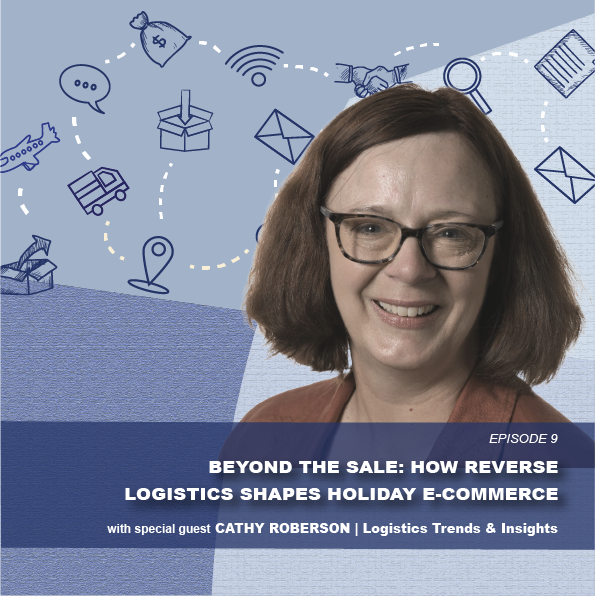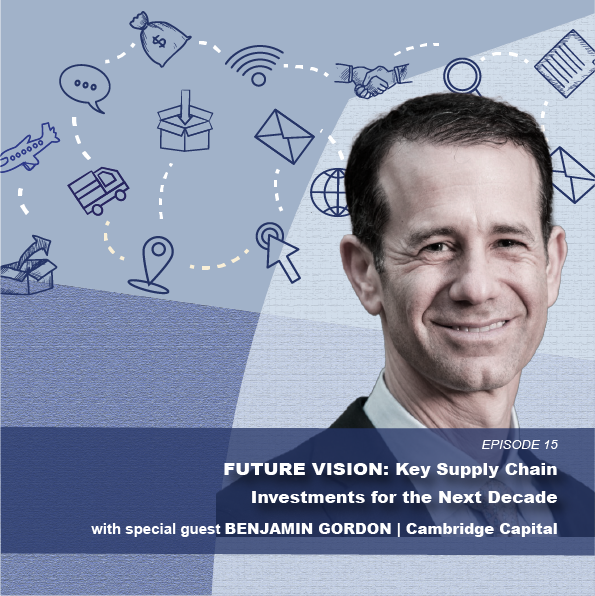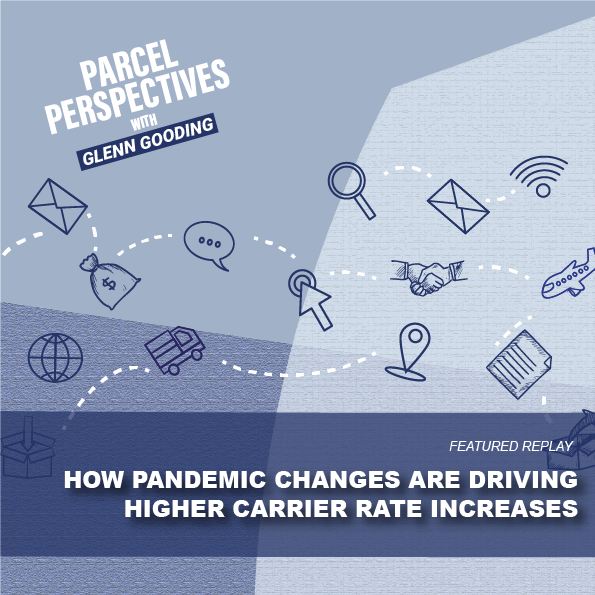A Consultant’s Role in Supply Chain & Carrier Contracts
Discover how logistics consultancy revolutionized small parcel shipping for Right Manufacturing Systems in this episode of Parcel Perspectives. Join Glenn Gooding and Ian Hartman as they discuss achieving a 23% reduction in shipping costs, leveraging data for smarter decisions, and the invaluable insights gained from expert consultancy. Tune in to learn how deep industry knowledge and strategic negotiations can transform your logistics operations.
Listen on:

Notes
In this episode of Parcel Perspectives, Glenn Gooding joins Ian Hartman, CEO of Right Manufacturing Systems, to explore the transformative impact of logistics consultancy on small parcel shipping. Initially skeptical, Ian was persuaded by his new private equity owners to consult with experts, iDrive Logistics, a move that led to a striking 23% cut in shipping costs after just two negotiations. The conversation highlights the critical role of continually revising contracts and engaging effectively with carriers to secure the best terms.
Glenn and Ian dive into how data-driven strategies have reshaped Ian’s operations, from eliminating unnecessary address correction fees to refining supplier shipment processes. Beyond cost reduction, the consultancy has leveraged business intelligence to enhance operational efficiencies and support acquisition synergies, providing Ian with invaluable industry insights.
Transcript
Ian Hartman [00:00:02]:
We negotiated a three year agreement and you know, I was thinking, okay, well, I’m not going to go back and ask for something more until that three years have transpired. Well, that first round when you guys were involved, we went and got 14% and then we went back a year later. We’d done a series of acquisitions and our spend was now different. It had grown. And so it was actually your coaching of us towards me that said, hey, your spend profile is different now. It’s more meaningful. You’re larger. Let’s go back again.
Ian Hartman [00:00:37]:
And when we went back for the second time, we got another 9%. So in the two rounds we are 23% savings.
Glenn Gooding [00:00:51]:
Welcome to Parcel Perspectives, the podcast dedicated to small parcel shippers. I’m Glenn Gooding and each episode we dive into insights, best practices and strategies to help you navigate this complex, costly market. Join me as we explore ways to strengthen your long term partnerships with your chosen carriers and stay competitively aligned.
Glenn Gooding [00:01:18]:
Hello everyone. Thanks for joining me again on another edition of Parcel Perspectives. I’m Glenn Gooding. I have a special treat for you today. Somebody that I think a lot of and have had a chance to get to know both personally and professionally. His name is Ian Hartman. He’s the CEO of Right Manufacturing Systems. I’m excited for what he’s doing.
Glenn Gooding [00:01:36]:
Now. I will tell you that our story began a couple companies ago in Ian’s career and so we’re going to take on, I think, an interesting and important topic, particularly in today’s market. That question is, why use a consultant to improve your small parts of supply chain? I think that’s a distinctive question. There’s a lot of stuff out there in the marketplace right now and I thought we’d kind of unpack that a little bit in some detail. So in this episode, we’re going to dive into the world of small parcel shipping again. Ian has worked with me, has trusted me to support him a couple times with a couple roles. I’ll let him talk about that in a minute. And we’re going to also explore how that partnership led to a refined supply chain, improved carrier selection and rock solid data driven decision making.
Glenn Gooding [00:02:26]:
So whether you’re growing an E commerce business or simply looking to optimize your shipping strategy, I think this episode is going to offer something valuable for you on the power of logistics consulting. So welcome Ian.
Ian Hartman [00:02:39]:
Thanks for having me on, Glenn.
Glenn Gooding [00:02:41]:
Always a pleasure. I really mean that. Care to tell folks a little bit about yourself and your background before we kind of get rolling?
Ian Hartman [00:02:48]:
Yeah, absolutely. So, you know, I spent Most of my career in the operations side of businesses, that’s where I’ve grown up. Most recently been on senior executive teams, titles like VP of supply chain. And before I came to Right Manufacturing, I was the COO of a business that was about 350 million top line sales. And you know, most of my. You will get into this probably as we go through, but most of my experience was on the inventory planning, demand planning and warehouse operations side of the equation. And then once to know you, Glenn, that’s when I really started getting into the freight side of supply chain. So when I think of logistics and operations, supply chain, I think of kind of a three legged stool where you have inventory and demand planning, warehouse operations and then the freight side.
Ian Hartman [00:03:45]:
So that’s kind of where I started.
Glenn Gooding [00:03:47]:
It’s a great analogy. That stool has a hard time standing on two legs, doesn’t it?
Ian Hartman [00:03:51]:
Sure does, yeah, yeah.
Glenn Gooding [00:03:54]:
So your first title, your first role when you and I got together was you were COO of the company at that time, right? Is that right?
Ian Hartman [00:04:01]:
No, the first company I was vice president of supply chain.
Glenn Gooding [00:04:05]:
That’s right, that’s right.
Ian Hartman [00:04:06]:
And in that role I had the operations side of the business. That business was somewhat unique where we were an industrial distributor. If you looked at our shipping profile on the freight side of the business, we had very heavy concentration in the less than five pound parcel, had a lot of ltl, but when you looked at our parcel, it was very lightweight. So that created some interesting opportunities when once we partnered with iDrive and with yourself to do some optimization efforts there.
Glenn Gooding [00:04:37]:
Great, great. So let’s dive into that a bit. I think it’s kind of a funny story in a way, what I’d love for you to share with everybody, you know, what kind of led you to hiring a consultant, hiring me in this process.
Ian Hartman [00:04:51]:
Well, you know, I would actually describe myself as somewhat consultant adverse. At least I had been up until when we partnered. And what kind of triggered the partnership there was the business I was working for. We were private equity owned and we had changed hands. We’d gone through a selling process and the new owner said, hey, we’ve had really good luck using this freight consultant, iDrive. We’d like you to bring them in, have them take a look at your guys’s contracts and see if there’s some room for improvement. So it was more hey Ian, you should go do this, rather than me thinking, hey, this is a great idea to bring consultant in. But you know, that’s kind of where our relationship started and I think you’d say it was probably one of the faster courtships.
Ian Hartman [00:05:38]:
You know, it was pretty quick from introduction to signed contract and getting down to work.
Glenn Gooding [00:05:44]:
It certainly was. You know, it’s surprising how quickly the sales cycle goes when you’re dealing with a hostage situation. Yeah, right. So, yeah, it’s interesting and I think that’s an important takeaway. I think there’s a lot of folks out there who are probably consultant averse. Right Y in some way or another. So as we consummated the partnership, as we got to work here, you are a very competent VP of supply chain, feel very confident in your ability to get things done and drive improvements. You’re kind of more or less coerced or forced into a partnership with me.
Glenn Gooding [00:06:17]:
What kind of expectations did you have or goals of this partnership kind of going in like that?
Ian Hartman [00:06:22]:
Well, you know, going into it, I thought that we had a very competitive contract with our small parcel carrier, which was UPS at the time. I thought we’d done a pretty decent job. We’d been through the negotiation process with them once before. I had been there probably two or three years before we changed hands and we’d negotiated that contract one time and I felt pretty good about it. So I wasn’t expecting that we were going to knock it out of the ballpark, but we did. You know, in the end, once we started peeling back the onion there, we found a lot of opportunity.
Glenn Gooding [00:06:57]:
Interesting. So I think that’s another important thing. So you were kind of the architect of the work that had been done so far. Was there any concern, defensiveness, kind of territorialism going into this? Like, who is this consultant Glenn Gooding, and is there a potential risk from your perspective at that time?
Ian Hartman [00:07:15]:
Well, I think yeah, that can be uncomfortable when you are the architect of what’s in place. But at the end of the day, as a leader and a manager in a business, if you can show bottom line results, if you can drive bottom line results, people have a short memory. They’re going to forget about the past and just focus on, hey, we’re getting some meaningful savings. And it’s what have you done for me lately? Not what did you do for me, you know, a year ago.
Glenn Gooding [00:07:42]:
Amen to that. So anything surprising in those early assessments that you hadn’t considered initially as we kind of get going? And I think you were charged with saying, hey, have this firm take a look at the program, what you have going. Any real surprising outcomes there?
Ian Hartman [00:07:58]:
Well, I think what was surprising for me was there were certain elements of the contract that I had worked hard to get that were emotional for me, like maybe a reduction to the minimum charge. But there were other things as we peeled back the onion and looked at the data that I hadn’t considered that had a really big impact on the overall cost of the contract.
Glenn Gooding [00:08:24]:
Okay, so if I could restate that, if I understood correctly, you had a perception of what you thought was driving expense for the company, you’d really kind of gotten your gut into those, you’d really worked hard to improve those. Right, right. And it sounds like on that initial assessment, having kind of a data driven approach allowed you kind of a greater perspective with greater detail of kind of where the money’s going and what the opportunities might be.
Ian Hartman [00:08:49]:
Yeah. And Glenn, honestly, I think one of the things that you guys did very well for us that brought a lot of value into the process was understanding how UPS in this case, well, UPS or FedEx, you know, the value was bringing in how UPS approaches the contract, what’s of importance to them, where they can bend and where they can’t. So, you know, if I focus in on a piece of the contract that is very difficult for them to bend on, I’m not going to get anywhere. But if I focus on another area of the contract that’s easier for them to bend on, I can get at least, or maybe even more than what I thought I could get on this other area. And going back to that three legged stool analogy, in my career I’ve been very focused on inventory and demand planning and on warehouse operations. And then I was put into a role where I was leading the whole supply chain side, but I wasn’t an expert in the freight side and I didn’t understand some of the cost drivers for the small parcel carriers. And that’s the perspective and the expertise that bringing you in was allowed me to understand. And I would say that at this point in time, having gone through, you know, I brought you into the first company, we then partnered again a couple years later at another company.
Ian Hartman [00:10:08]:
I would consider myself, you know, not expert level to your level, but compared to the average Joe, I know a whole lot about the parcel space now.
Glenn Gooding [00:10:17]:
Yes, you do.
Ian Hartman [00:10:18]:
And I can be pretty effective looking at a contract and saying, hey, we’re doing good here, we have opportunity here, which, you know, it’s like I brought in a fractional expert, you know, like in my current business, we’re not a real big business and we have a fractional cfo and he’s a tremendous asset to me, but I don’t have to Pay a full CFO wage. And that’s kind of what I got out of you guys was I got a fractional freight expert and you guys provided a lot of value in that regard.
Glenn Gooding [00:10:46]:
Great. So I don’t know of any supply chain initiative that didn’t involve cost reduction is one of the main tenants. Right. So what were the cost targets? What were the expectations of this project as you brought a firm in?
Ian Hartman [00:11:03]:
Yeah, so in my experience, we like to talk about freight as a percent of revenue over percent of sales at the highest level. Obviously there’s ways to break that down in different dimensions, but we were targeted. We had seen freight as a percent of sales escalate in both businesses. We’d seen it escalating over the period of 12 or 24 months. And we wanted to get that down to where it had been historically and put those dollars back to the EBITDA line. And so that’s really where we were focusing mostly was freight as a percent of sales.
Glenn Gooding [00:11:39]:
Great. So we did an assessment. We identified potential areas of opportunity. Right. At that point, it was kind of time to circle around and determine how we were going to go about this. Right. How were we going to message that? What did you think or what was your perspective on the approach we took to going to market, talking to your incumbent, talking to the non incumbent and kind of the negotiating steps throughout the way? Right.
Ian Hartman [00:12:08]:
Well, we touched on the data driven aspect, you know, and that’s hugely important. When you’re sitting across a negotiating table with a UPS or a FedEx, they typically know more about your business and your shipping profile than you do. Because it’s not their first rodeo, and that’s their core business, is to understand, you know, understanding your business is what allows them to profitably service your business. And so we really looked at the data, we looked at the cost blocks. You know, on our average shipments, where was the cost being incurred and what did our shipping profile look like? How many small parcels did we have? You know, as I mentioned, the one business had more than 50% of our parcels were less than £5. So if we’re going to make inroads on our total cost profile, we have to make inroads on that parcel 100%. And so I think, generally speaking, I think it was just the data driven approach. More specifically though, in actually both of the businesses we had trouble getting the non incumbent.
Key Topics with Timestamps
- 00:00 Consultants Improve Supply Chain Efficiency
- 04:51 Consultant Partnership Initiated by Ownership
- 12:08 Data-Driven Shipping Negotiations
- 15:29 Maximizing Impactful Negotiations
- 21:59 Assessing Consultant Value: Cost vs. Benefit
- 25:10 Overcoming Procrastination with Consultants
- 27:55 Shipping Strategies and Expertise
Other Podcasts
-
How Reverse Logistics Shapes Holiday eCommerce
Join Glenn Gooding and Cathy Roberson as they dive into the world of reverse logistics. Discover how carriers like UPS, FedEx, and USPS are adapting to the growing returns trend, and explore innovative strategies for handling oversized items and complex returns. Learn about the latest trends, including "bracketing" and sustainable practices, and how AI is transforming the returns process.
-
Future Vision: Key Supply Chain Investments for the Next Decade
The Future of Logistics is Here. Join Glenn Gooding and special guest Benjamin Gordon, Managing Partner and CEO at Cambridge Capital, in this week's episode of Parcel Perspectives as they explore the cutting edge of supply chain management. This episode covers it all: the AI revolution, the eCommerce explosion, the crucial role of customer experience, and the growing importance of sustainability. Get expert insights into future investment opportunities and discover how to build a resilient supply chain that can withstand any disruption. Tune in and future-proof your business!


